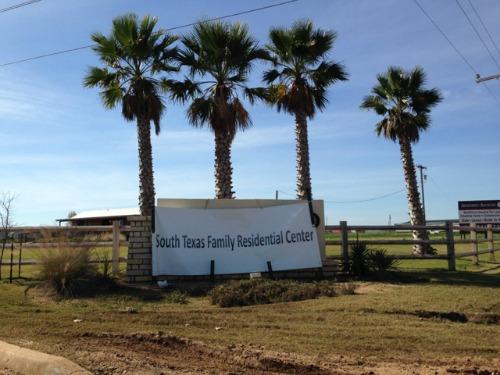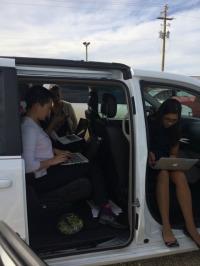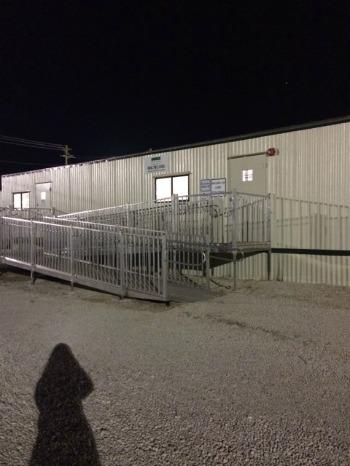A Speedy Response
Columbia Law School Professor Elora Mukherjee and Students in the Law School's Immigrants' Rights Clinic Were the First to Offer Pro Bono, Individual Representation to Asylum Seekers Detained at a New Family Detention Center in Dilley, Texas
New York, February 18, 2015—U.S. immigration courts only accept paper copies of documents in asylum cases, so when eight Columbia Law School students traveled recently to Dilley, Texas to represent women and children held in a new government-run family detention center there, they packed a printer in their rented mini-van.
Because Immigration and Customs Enforcement and its contractor, the Corrections Corporation of America, don’t allow laptops or cell phones into the facility, the students had to take notes with pen and paper during meetings with clients. And because the facility denied every request they made for legal phone calls with their clients, the students had very limited time to prepare for bond proceedings before a federal immigration judge.
| A sign outside the new Immigration and Customs Enforcement family detention center in Dilley, Texas, where eight Columbia Law School students represented asylum seekers pro bono. (All photos courtesy of the Immigrants' Rights Clinic) |
Asylum seekers who are able to post bond can pursue their claims while living freely in the U.S. Those who cannot must continue to fight their case from detention facilities like Dilley.
As students in the Law School’s Immigrants’ Rights Clinic, the young men and women initially agreed to represent four families—all women and children—for only their bond hearings while in Dilley from Jan. 26 to Jan. 30. Together with Professor Elora Mukherjee, director of the clinic, students sometimes spent close to 12 hours daily at the facility. The demand for pro bono legal services was so great that they met with up to 40 women a day in the visitation room. By the time they left Texas, the clinic had taken on a dozen families as clients and agreed to represent most of them on bond hearings, another family in a request for a new Credible Fear Interview, and another family for the entirety of the asylum process. All the representation will continue remotely from Morningside Heights.
In Dilley, the students argued that their clients should be released on their own recognizance without posting bond. But the clients still were hit with amounts ranging from $4,000 to $8,500—insurmountable sums for refugees who often come to the United States with nothing. The students rushed to and from their rental car to type out pleadings, printed out their materials where they could, and scheduled filings around the last pick-up time at the nearest FedEx.
| The clinic students were not allowed to bring laptops into the facility, so they returned to their car between client meetings to work on case filings. Amy (Tiantian) Zhu '15, left, prepares a document for one of her clients. At right, Catherine Y. Kim '15, left, and Professor Mukherjee work on cases in the clinic's rented van. |
Their work was desperately needed; more than 400 women and children are held in the new facility (it will hold 1,200 by next month and 2,400 by the end of the year), and Mukherjee and her students were the first—and only—people providing pro bono, individual representation on site. By the time they get to Dilley, which is run by the country’s largest for-profit prison operator, asylum seekers have been held in cells known as hieleras (Spanish for freezer) and warehouse-like units called perreras (doghouses). They are stripped of all possessions—including wedding rings and rosaries—housed with strangers, and counted in their bunks multiple times a day.
“We’re not talking about people who have been convicted of any crime,” said Mukherjee, at a discussion about the Dilley trip at the Law School on Feb. 12. “We’re talking about kids and their mothers who are seeking safety in the United States.”
The students were so moved by their experiences and the conditions under which the asylum seekers are being held that they launched a fundraising initiative on their own time to raise money for the bond proceedings. They’ve incorporated the initiative as a non-profit organization and are seeking 501(c)(3) status. So far, they’ve raised more than $12,000, and two of their clients have been released, together with their children ranging from four to nine years old.
| The shadow of Nicole Taykhman '16 outside the Dilley family detention center, which is run by Corrections Corporation of America, the largest for-profit prison operator in the U.S. |
Working on family detention issues has been a defining part of Mukherjee’s professional career. As a fellow at the ACLU, she was part of a team of advocates—including local law students—whose work helped stop the flow of families into the first prison-like detention center outside Austin, Texas in 2009.
“It seemed like an ugly chapter of American history was over,” Mukherjee said. “But once more, law students are at the forefront of efforts to investigate family detention issues. This time they’re from Columbia Law School.”
The clinic is coordinating efforts with immigrants’ rights advocates around the country to ensure adequate representation for the asylum seekers in Dilley.
“When we were there, there were 408 asylum seekers and we were the only people there offering pro bono legal work,” said Catherine Y. Kim ’15. “When we left, there was no one.”
Participants in the Immigrants' Rights Clinic and the Dilley pro bono work included: Amy M. Elmgren '16, Bianca M. Figueroa-Santana '16, Nicole Z. Gonzalez '16, Catherine Y. Kim '15, Arielle I. Littles '16, Nicole Taykhman '16, and Amy (Tiantian) Zhu '15.



